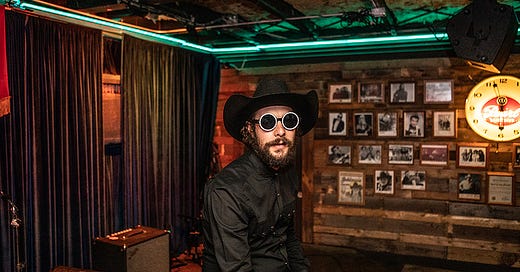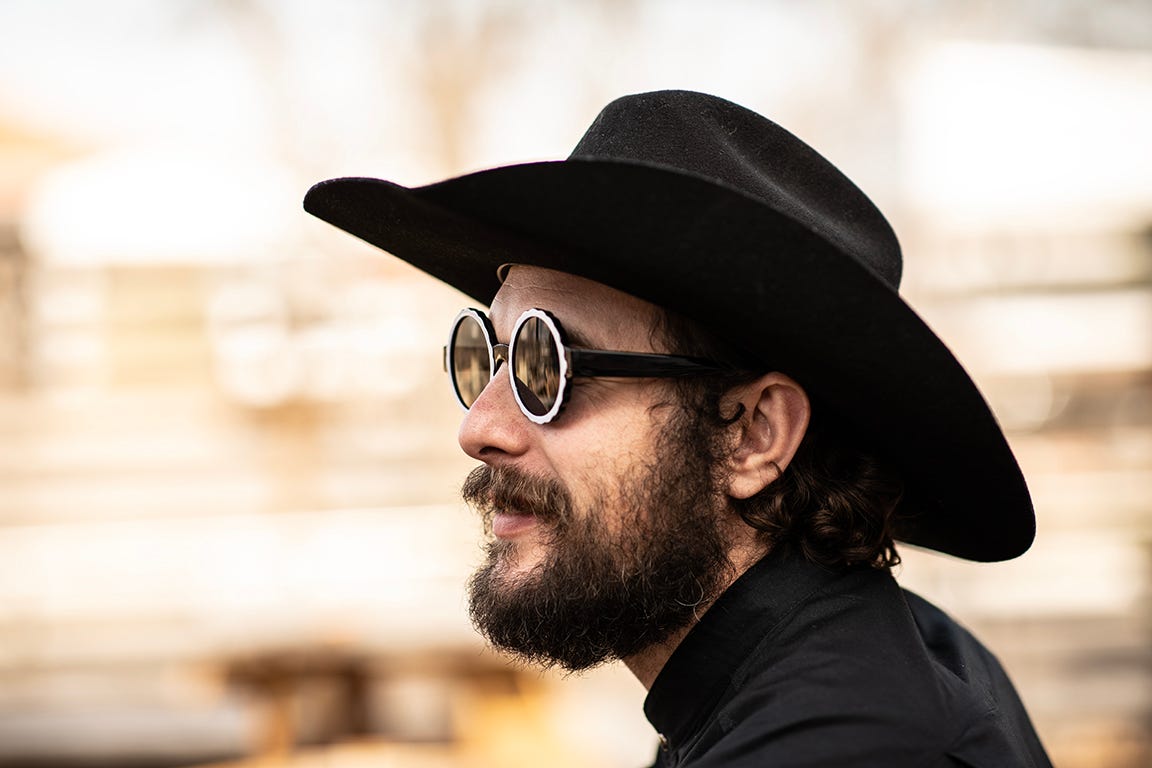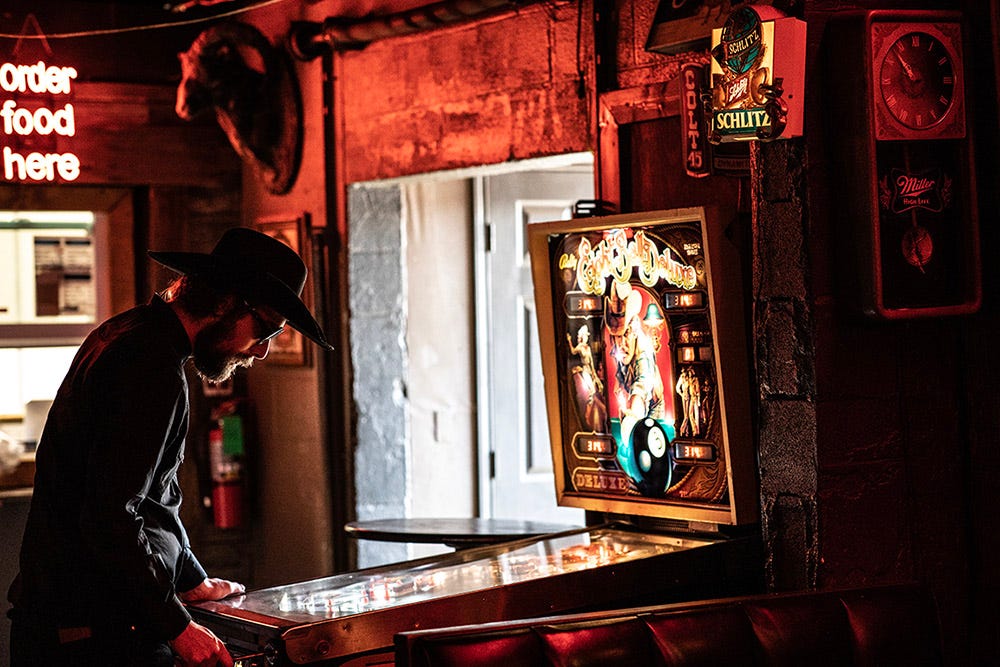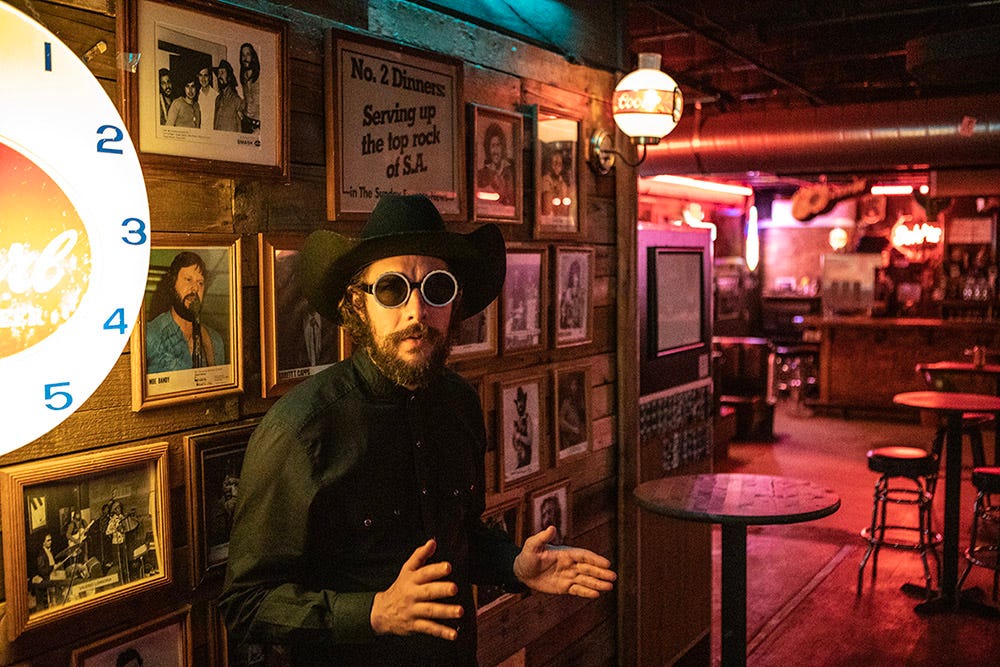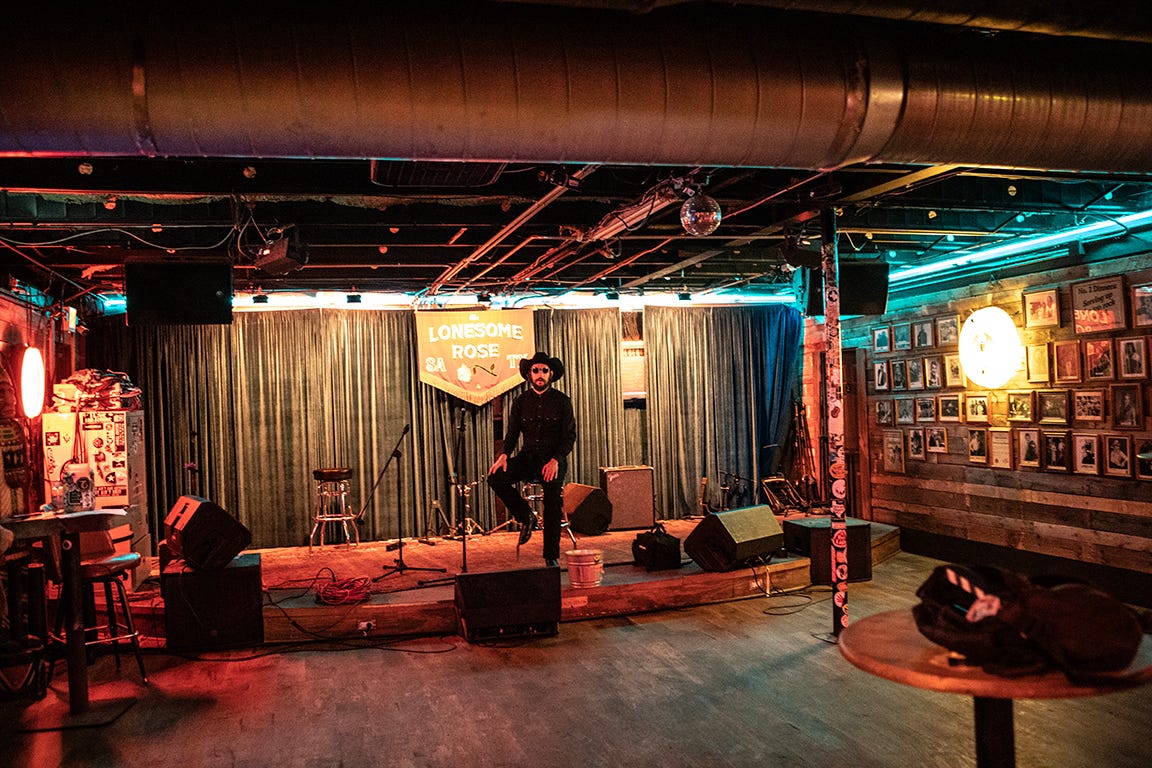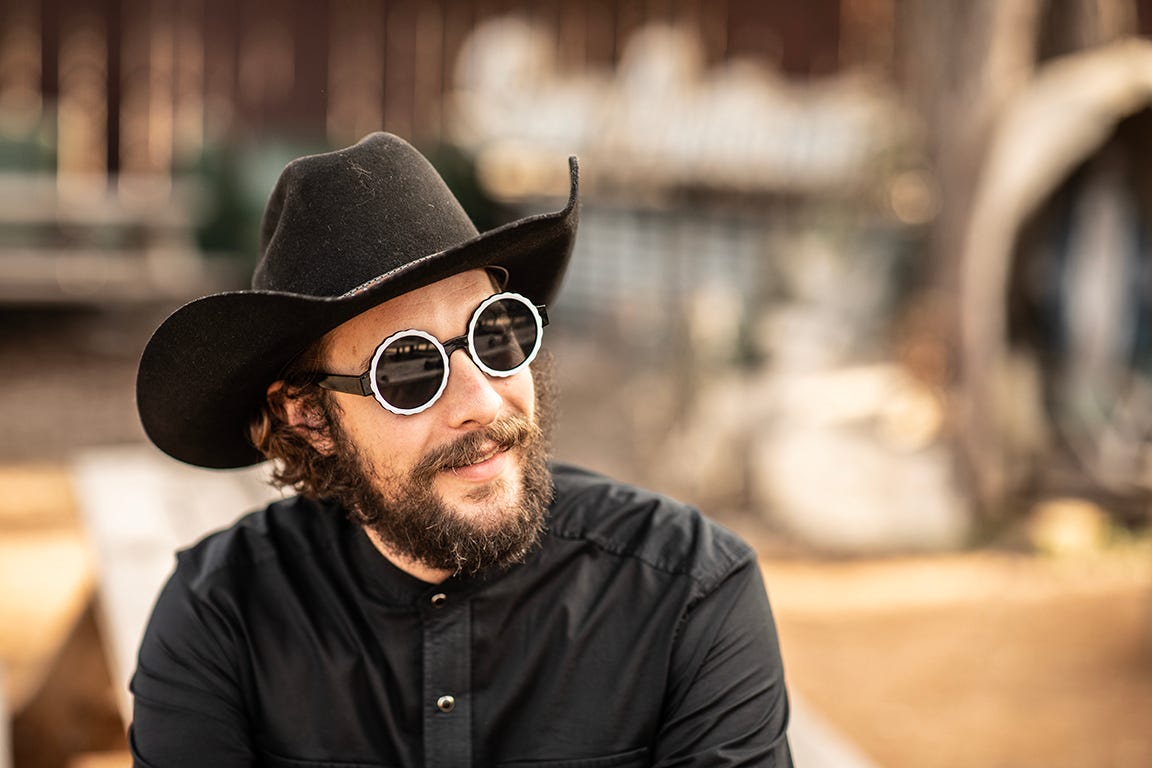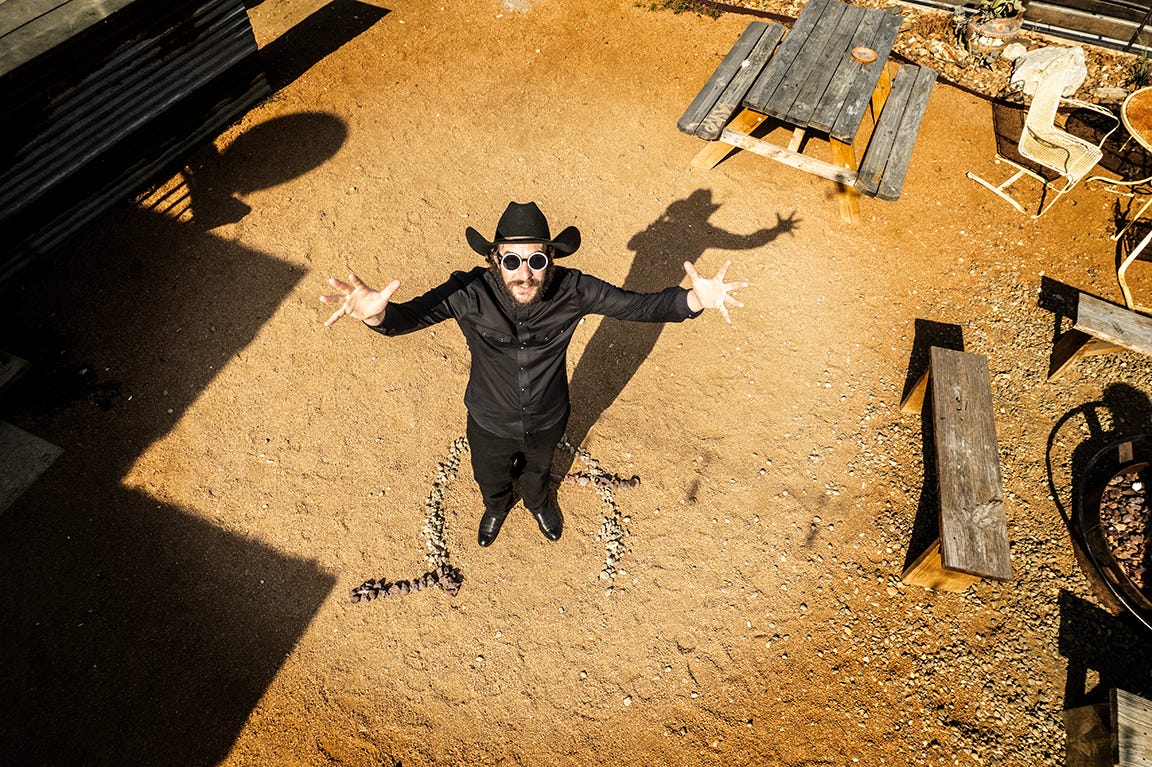Bread & Space Circuses
After brisket tacos, Garrett T. Capps will continue taking Texas music to a better place.
Did you see the Doomsday Clock? It indicates our world is now closer to catastrophe than it’s been ever since the damn thing was created by the Bulletin of the Atomic Scientists, in 1947. Which is precisely why I chose to enjoy lunch with Garrett T. Capps. Time will tell if I’ll ever get the chance again.
Capps’ music has proven to be a balm for troubled times after I discovered it last year. “I like Austin, but I Love San Antone” is a jumpy honky-tonk tune and Capps’s thoughtful vote in favor of his hometown in the rather pedantic rivalry (including who serves the tastiest breakfast tacos) between those two Texas cities. But I’ve really fallen hard for his 2022 full-length release People Are Beautiful, which he made with his band NASA Country. The album’s title and title track hit a well-needed optimistic note for modern life—even reminding us that the only thing that can turn back the Doomsday Clock’s hands is people.
The album opens with “Getting’ Better”—although it’d be more precise to back up and say that it actually launches with slowly building spacey sonic waves from Justin Boyd’s modular synth. Boyd forms an instrumental cosmic backbone around which Capps (acoustic guitar), Torin Metz (lap steel), Kory Cook (drums), and Odie (just Odie, bass guitar) diligently pump Texas blood, sweat, and thump into the body. Lyrically, Capps looks for all the silver linings that might be found—promising more of them ahead, too.
I dig the music because Capps is doing something that feels more invigorating than much of Texas music. People Are Beautiful is undeniably at home in modern country categories; Capps simply decided to drive his songs through a nearby galaxy to evoke more of a gravity-less buoyancy.
Since this isn’t an actual album review, I can admit things like Capps’s music immediately lifts me into a much better orbit from which to deal with the ticking of that damn Doomsday Clock, plus a lot of other things that try to get in my way of having a good life, like freezing rain and property taxes.
Which is why I’m for certain gonna pick up the lunch check.
At exactly high noon plus about ten minutes, we meet in San Antonio at Garcia’s restaurant, open since 1962. The dining room is adorned with vintage bullfight posters and a curious number of very sincere paintings of roosters. My buddy, the photographer Kirk Weddle, joins us too.
“I always run into interesting people when I’m here,” Capps says, explaining his fondness for Garcia’s. “Apparently, [legendary San Antonio musician] Doug Sahm would come hang out. I came in here once and [comedian] Gabriel Iglesias was filming over there. It’s superior quality food too. The brisket taco is pretty awesome.”
Capps is a tall, young, man in black—head to toe except for the beard, including pearl snap shirt, a “shrewdly black” western-style hat, and circular sunglasses. He’s not Johnny Cash man in black as much as he’s a young Kinky Friedman man in black.
In between bites of tacos we all chat about San Antonio visual artists like Jesse Treviño and Vincent Valdez. We talk about mutual friends. When we discuss Garrett T. Capps and his early beginnings, Capps explains, “I went to Texas State [University] in San Marcos for business marketing. I remember learning the difference between marketing and advertising. Now, particularly when I’m booking bands and when I’m putting events and shows together, I’ve realized I actually liked thinking about all that stuff back in school, but I didn’t know it at the time.”
He also says that all that book-learning about business probably influenced, or more precisely fused itself to the backside of his performance and songwriting persona over the years. This is his job, no doubt, but as he becomes more honest and organic and authentic with his music, in turn, he’s finding bigger audiences, much more critical acclaim, and is covering his expenses of recording and performing. (That’s a victory in this state’s musical economy.)
When it comes to that music, it’s currently pushing deeply into cosmic country and psychedelic territories. The press has taken notice. For instance, Rolling Stone called People Are Beautiful “Kraut-Country” music (Capps says he might have coined the term), giving credit to Capps for blending electronic influences from the seminal German band Kraftwerk, for example, with Doug Sahm, the gentleman hippie of San Antonio who delivered Texas music to a wider audience in the 1960s and ‘70s. Rolling Stone also called Capps a “Texas Weirdo.”
It’s a flattering article, to be sure. But having seen Capps play live and after chatting briefly with him before this Tuesday afternoon in January, I never formed the opinion that he was much of a weirdo. At lunch Capps tells us that he’s been evolving slowly toward his current reputation, which he’ll admit has settled into being somewhat offbeat. There are little things, like how his shirts often sport a variety of funky Texas and space-age images, and how his videos appear to be well-thought-out accompaniments to his songs—sometimes playful, sometimes experimental. His stylized sunglasses are essentially his trademark. But that’s all mostly to support the performer named Garrett T. Capps.
“I don’t wear black all the time,” he says in between bites of brisket taco. (He’d also removed his sunglasses when he first joined us at the table.) “But a lot of what I do is from an organic place. My performance-art mindset? It isn’t completely natural for me to stand in front of people. I feel like I have to do something extra. That’s how it feels with the visual stuff.”
It turns out that three guys can talk and eat pretty quickly when the food is so damn good, like at Garcia’s. It’s not long before we’re on our way to the Lonesome Rose, a honky-tonk that Capps co-owns and for which he books the talent. It’s just a mile or so away, and it makes me extremely happy. Having visited the club a few months back to watch a friend play a show, I’m into the Lonesome Rose’s vibe.
It’s a lovely, semi-divey club. It’ll become a San Antonio staple with a little more seasoning. There’s a low-slung stage to the left of the front door; the only other required furnishing needed in a honky-tonk, the bar (in this case, with beer and a full lineup of intoxicating spirits), is opposite the stage to the right. On the far wall is a vintage Eight Ball Deluxe pinball machine from Bally, just waiting to take my quarters.
Weddle gets busy doing his thing, setting up lights and filters, taking test shots, enjoying a beer while the pinball machine’s silver ball jumps and dashes around the playfield. (That’s an authentic pinball term, by the way.) I’ve loved playing Eight Ball Deluxe since middle school. Blinking lights and clacketing sounds are just about the only things seen and heard within the darkened bar for almost half an hour. (But the story must go on.)
Although Capps plays the Lonesome Rose on occasion, he also books the bands and promotes the venue as a place for original music to thrive. (At least now that live music is finding its place in polite society again; live music definitely feels the lingering malaise of a post-pandemic world.)
“The business side—running a venue, booking shows—I like that part too,” says Capps.
In a Juke.press exclusive, he tells me that one of the first shows he booked in San Antonio, in 2011, featured Nik Turner, an early member of the underappreciated English space rock band Hawkwind. (Their song Silver Machine is a real trip, man.) There can be little doubt that on that night Capps saw the future, a version of it anyway, that didn’t necessarily fit the world’s perception of Texas music.
He’s a fan of Austin’s psychedelic rock pioneer Roky Erickson, who founded the groundbreaking 13th Floor Elevators in 1965 and which—just as Hawkwind did for progressive rock—urged Texas to look beyond the borderless skies for sonic inspiration. When psych rock and country twang merged, quite a big bang followed; Capps and NASA Country appear to have formed in its afterglow.
Weddle has prepared the Lonesome Rose for a proper photo shoot. Capps gets in front of the camera and begins to release a little more Garrett T. Capps. He pays attention to his hands. He’s quite aware of the importance of good publicity, which he is enjoying right now with ever-expanding recognition of his live shows as well as his new album.
Weddle shoots him on the stage for a while, the velvet curtain behind is soaking in the camera flash, turning its gemstone blue fabric into midcentury sofa green. We walk around the club, pausing for good-looking backgrounds. I bug the talent with questions. Capps takes it all in stride.
“It’s easier to make interesting music than it is to write words that are just as important. Lyrics… expressing myself on a vulnerable level feels like … that shit’s still hard to do. It feels raw, exposed, and scary.”
Are those the better songs?
“Probably. Probably.”
“What you’re doing with your hands is perfect,” Weddle assures Capps as the flash pops.
“I used to have songs that had a different perspective than myself. Looking back, I don’t really like those songs. I try not to do that too often. I like them to be a genuine extension of myself. I think humor and music are hard to do, and when I do it I try to do it tastefully. It still has to feel true.”
He recalls getting his college degree and not playing all that much music, although he did work at the school radio station. “When I was younger I wanted to play drums like Dave Grohl [of Nirvana and Foo Fighters; Weddle chuckles, naturally]. I started to write songs early, at college, and I liked Steve Earle and Robert Earl Keen, the usual suspects in this part of the world.”
Capps explains he used to lean on “like a crutch” the style of songwriting that was, in his words, “metaphorical word soup.” Today, he’s apt to be straightforward and just tell you what he’s thinking about.
“Time Will Tell” is a song that sits in the middle of People Are Beautiful. It sounds like a simple fact of life. “You don’t have to say much more,” Capps says. In fact, that’s the only lyric in the 5:35-long song, being repeated over bass-beautiful music. “We didn’t know what the title was going to be as we were making it. One day we just decided—well, either I said ‘time will tell’ or I texted it to Justin Boyd, and I think that’s how that happened.”
Capps also plays shows solo and alongside assorted musicians, depending on the gig. He assembled NASA Country specifically for the new album, which was recorded in San Antonio’s Southtown. The music sounds tightly composed and loosely, comfortably played (unless it’s the other way around). The absolute best thing is that it foreswears all the navel-gazing being done by far too Texas musicians and in its place substitutes sonically impressive musicianship along with lyrics that invite others to sing along without feeling like they’re reading somebody’s poorly composed diary.
Weddle suggests going out to the oversized backyard.
In the short term, Capps explains, he’s pretty happy playing shows in San Antonio, Austin, Houston, Fort Worth, and a lot more of Texas, both solo and with NASA Country. He’s done some touring in Europe and found Netherlands especially fond of his sound. In May he embarks on a two-week tour of the Midwest along with Scott H. Biram, another Texas musician trying to do anything but same old same old.
Weddle fires up his UFO photo-drone. Once it’s overhead, for no particular reason I can recall, I point to the drone and shout to Capps, “That’s your god up there! You want to get with it!”
The talent plays along, even if it’s kind of weird. He doesn’t know it, but he’s setting up the last line of this story while posing for one of Weddle’s rad aerial photographs.
The afternoon eventually winds down with three guys just talking shit with one another.
“What if I didn’t give a shit about anything?” asks Capps. “What if I picked up a guitar and just played all day? Rent has to be paid, but the thought drives me.”
I don’t think that’s going to happen. (As much as I wish such happiness upon him.) Capps is slowly infiltrating San Antonio’s musical zeitgeist and threatens to blow up the place any moment now. His music is exciting—and to think, it’s been audaciously crafted to invoke something like hope. Without hope, many are lost. Just look to the Doomsday Clock if you need proof.
As we wind down the afternoon, only one question remains unasked. “What comes next?”
For Garrett T. Capps, I think the only answer is to keep watching the skies!
All photos in this piece were taken by Kirk Weddle at the Lonesome Rose on January 27, 2023.
If you prefer to make a one-time donation, you can now contribute any amount to Juke using these Venmo and Paypal links.
Anthony Head mostly writes about Texas.
Kirk Weddle, of Austin, creates enticing imagery for editorial, advertising, and corporate clients around the world. He shoots on location, in the studio, and underwater.

